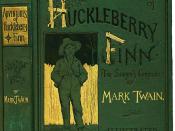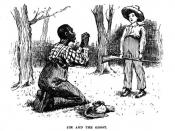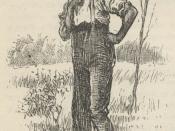As it was put by British novelist Laurence Sterne, "No body, but he who has felt it, can conceive what a plaguing thing it is to have a man's mind torn asunder by two projects of equal strength, both obstinately puling in a contrary direction at the same time." One cannot help but agree with this statement, especially after reading Mark Twain's The Adventures of Huckleberry Finn. In this story, a young boy named Huckleberry Finn (Huck for short), experiences the lasting effects of the influences of the racist society around him. Throughout the story, Huck is constantly "torn asunder" by decisions that are accepted by society, yet are against his own moralistic decisions. Through the character of Huckleberry Finn, one sees that the previous influences and ideals (either good and/or bad) from a society never cease to disappear, even when one's conscience is morally correct and that good choices are made through experience (either accepted or controversial).
As one of the society's many influences/ideals in the book, racism and the views towards blacks are the most prominent topics that show just how powerful and influential a society can be on the malleable mind of a young child who is struggling to do what is right. During this time period, many whites, if not all, had deep feelings of contempt and hatred for the black slaves. Many saw them as low beings, as though equal to any wild animal, and showed no sense of care or concern for their well being. This appears in a conversation between Sally Phelps and Huck (role playing Tom Sawyer):
Sally: Good gracious! Anybody hurt?
Huck: No'm. Killed a nigger.
Sally: Well, it's lucky; because sometimes people do get hurt (246).
Through Aunt Sally's comment, a black man doesn't count as a real person. A...


